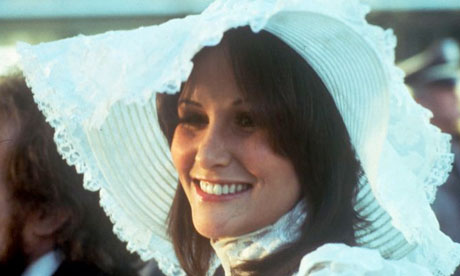This week, at the Sundance film festival in Park City, Utah, excited crowds filed into a theater for Lovelace, a new film about 1970s porn star Linda Lovelace, starring Amanda Seyfried and directed by Rob Epstein and Jeffrey Friedman (both of The Times of Harvey Milk). A group of mostly Mormon protesters stood dourly outside the packed house. They objected to the film's sexual content.
In a Q&A session, a producer rather autocratically dismissed the protesters. She would have done better to have had a screening for them; they would have found much to like.
The movie details the rise, fall, and rebirth of a young woman, Linda Boreman, who leaves her repressive family for the manipulative Chuck Traynor. His violent control transforms her into a "spokesmodel" for fellatio in the first porn film to be mass-marketed: Deep Throat. Finally, she begins a new life with a new family. It is a highly conventional narrative about women and sexuality, and it will hit the sweet spot for a wide audience.
Though they cast Boreman sympathetically -- Seyfried plays her as a passive, pliable victim -- the filmmakers let the camera linger on titillating shots of her naked nubility, and showed graphic scenes of oral sex. Then, they try to undercut the audiences' arousal by splicing in horrifying images of Linda's abuse and degradation at the hands of her brutal manager-husband.
The real Linda managed to escape, and eventually co-wrote a memoir about the cruelty she suffered, even while she was feted by society (her husband actually had her gang-raped for money at one point, and held her at gunpoint during sex scenes). This screenplay, though, attributes her redemption solely to her second husband and child.
This movie is important, all the same: it shines a light on that critical turning-point in the 1970s when a sexual revolution, which could have created a positive and powerful frame around female sexuality, became instead dark and commodified by a violent, often mafia-run porn industry. This corrupted revolution created the sexual norms we now inherit.
A positive feminist frame would not have been a dramatic departure: William Leach's True Love and Perfect Union: The Feminist Reform of Sex and Society has reclaimed the lost history of the late 19th century, when the main discourse in American feminism was not about the vote or equal pay, surprisingly, but about an embrace and scientific understanding of female sexuality.
At the same time, Lovelace (predictably) plays into the expectations of the industry it critiques, setting a new precedent for the most x-rated material in a mainstream movie. This should worry parents: it continues the normalization of pornography that Deep Throat pioneered.
The film is sure to cause fights among some heterosexual couples. How many young men who will (jokingly?) say "Breathe" to their girlfriends during oral sex, after they hear Traynor give this advice to his wife so that she might "deep-throat" him? How many young women will feel either intimidated by an impossible new standard of sexual performance, or angry at being treated like a porn performer? (Traynor's advice also won't do anything useful about the human gag reflex, as Boreman herself warned.)
The script cuts out a key moment in Boreman's life: before her second husband "saved" her, feminism actually saved her with its analysis of marital rape, pornography, and sexual degradation. As her obituary notes, feminists embraced Boreman, and she used their ideas to make sense of what had happened to her. She spent years touring to talk about abuses in the porn industry from a feminist perspective.
This omission may have made sense in terms of box office appeal, but it is a huge departure from the historical record, and the truth of Boreman's life.
Nonetheless, to the film's credit, Lovelace is the first mass-market depiction of the violence against women that is endemic in the sex industry. The film brought in law professor Catharine MacKinnon as a consultant; it was she who, with radical feminist writer Andrea Dworkin, wrote the Minneapolis Ordinances -- proposed legislation that would have limited pornography as a violation of women's civil rights. MacKinnon also wrote the influential Feminism Unmodified, which further spelled out the harm she saw in pornography. (The authors called the ACLU, which defends pornography as free speech, "the pro-pimp lobby".)
I interviewed Antonia Crane, who has been a sex worker and written a memoir, and has also worked as a film consultant (though not on Lovelace). When I asked her what she wanted to see change in the sex industry as a result of the film, she replied:
"I enjoyed Lovelace, but it was a very sad portrayal ... Not only was it about sexual assault and domestic violence, it was also about a young girl with limited options, who was basically kidnapped and sold into porn.
"I've met legions of such doe-eyed beauties. I've lapdanced next to them for years, with their pimps lurking. I never had a pimp or thought to get one. But then, I had marched into the San Francisco stripclubs with my women's studies education, ready to hate men and to steal their money."
Crane mentioned a Rebecca Solnit essay on sexual violence and went on:






